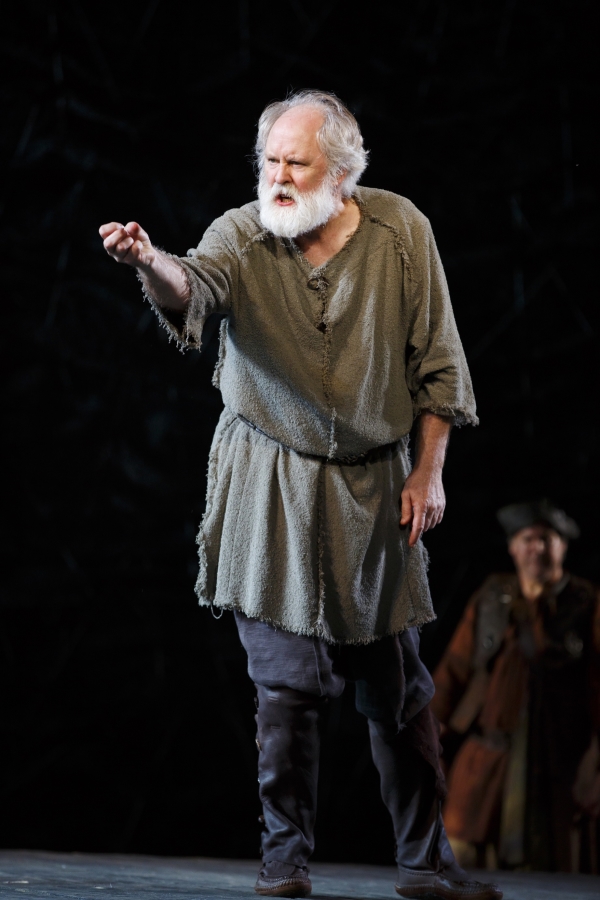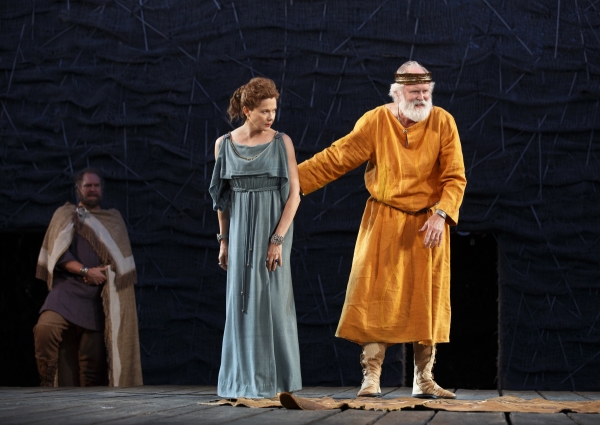Lear, There and Everywhere: Notes on a Tormenting Play

(© Joan Marcus)
I went to see King Lear, at Central Park's Delacorte Theater, though as usual I quailed at the thought of seeing it. Shakespeare's great tragedy falls into a category all its own for me: a play that I know well, love dearly, and am always a little reluctant to face. I know that if I go, I will be harrowed. If the production is bad, I will be harrowed by the play's substance and pained by its execution; if the production is strong, I will be doubly harrowed by the play's power. And though Lear doesn't pile up acts of explicit violence in the cartoonlike manner of the early histories or Titus Andronicus, its peak violent moments, like the blinding of Gloucester, call for some explicitness — and contemporary directors have often answered that call all too eagerly.
I'm not alone in this. Popular as Lear is, many have quailed at the prospect of witnessing it. From the Restoration until the 1830s, the British public preferred Nahum Tate's 1681 adaptation of it, tidied up to pacify audiences, in which Lear survives long enough to bless the marriage of Cordelia and Edgar. The great critic Samuel Johnson, preparing his edition of Shakespeare in the 1760s, enthusiastically concurred, giving a glimpse of his own sensitivity: "I was many years ago so shocked by Cordelia's death, that I know not whether I ever endured to read again the last scenes of the play till I undertook to revise them as an editor."
One can't blame Johnson. Watching a powerful king go demented is a discomfiting spectacle at best. (Between 1811 and 1820, when King George III was mad, censorship kept Lear off the British stage entirely.) And the agonizing sight of Lear's entrance in the last scene, with his beloved daughter's corpse in his arms, is about as painful as a Shakespearean scene can get.
Torture and torment are in fact bound up with Lear. As Caroline Spurgeon pointed out in her pioneering and still essential work Shakespeare's Imagery, every few minutes brings a line that refers to bodily pains, either natural or inflicted by others. And the images are often given, graphically, in verb form: In Lear the human body or its spirit is wrenched, pierced, beaten, flayed, scourged, stung, scalded, and finally — in the image that becomes Lear's epitaph — racked. Lear hates, says Kent, the man "who would on the rack of this tough world / Stretch him out longer." A principal set of subsidiary images deals with eyesight and blindness, in an ironic way that contrasts the physical act of seeing with the inner spiritual act of understanding: In this play, the blind and the mad see better than the visually equipped sane.
Embedded deep in the last segment of the play's long and complex text is one of Shakespeare's shortest and most complete narratives, a favorite passage that always makes me cringe; it seems to sum up so succinctly Shakespeare's view (or one of his views) of human life: the story of Edmund's Captain.
This character has no name and speaks barely 20 words, but the combination of what he says and what he does tells us everything about him. Edmund, having won the battle and captured Lear and Cordelia, gives this captain secret instructions, promising him "noble fortune" if he obeys them without question. "I cannot draw a cart, nor eat dried oats," the Captain replies. "If it be man's work I'll do't." He then goes offstage to carry out the instructions, which tell him to hang Cordelia and Lear, making it look as though they killed themselves. As he's hanging Cordelia, Lear kills him. End of a very short story.
So that's what an ordinary soldier, in this play, considers "man's work": to murder two prisoners of war, an old man and a young woman, and lie about it. And this sturdy fellow believes that he's better than a horse. ("I cannot draw a cart, nor eat dried oats.") One wonders if Jonathan Swift were thinking of this passage when he invented the Houyhnhnms, the race of intellectual horses who control the bestial race of men in the last segment of Gulliver's Travels. (Or, conversely, if Brecht weren't thinking of it when he made Mother Courage end by pulling her own cart, at which point she has little more than dried oats to eat.)
History, of course, has not only reaffirmed Shakespeare's view of such men, but has supplied revolting enhancements to it. The Nazi officer who supposedly completed his doctoral dissertation on the humanism of Goethe while on guard duty at Auschwitz stands as a mid-20th-century update of Edmund's Captain, and our own time has supplied many equally uncheerful variants: People who strap weapons to themselves to blow up innocent bystanders and call it Islam; people who scream at vulnerable, frightened young girls going into abortion clinics and call it Christianity; people who pay their workers starvation wages for exhausting schedules, while reaping billions in profits themselves, and call it sound business practice. No doubt they all think that they are better than horses, but I disagree, and I believe that Shakespeare would, too. More on this, and other ways in which Lear relates to us, next week.

(© Joan Marcus)











